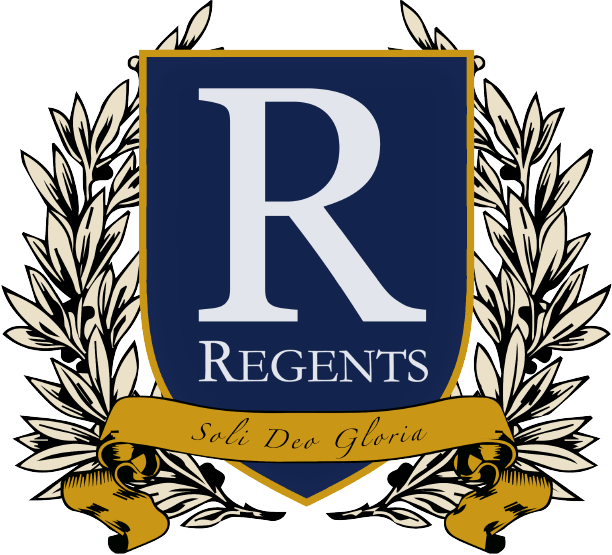
© 2026 Regents School of Charlottesville.
How does this beautiful ideal play out in day-to-day life at Regents School? Each year in Grammar School, students learn oration by speaking publicly before an audience. Starting in kindergarten, teachers help students memorize facts to present before an audience at Planet Day. What starts as individual recitations of memorized facts in kindergarten and first grade, blossoms in the upper elementary years into into student speeches such as at fifth grade Explorer Day.
An additional aspect of learning to speak well in the Grammar School is Regents' drama curriculum. From first to sixth grade, each student has a part in a class play with lines to learn and speak. Drama teacher Kara Faraldi works with students on enunciation and projection through games and warm-ups as well as through the play itself.
In Logic School (7th/8th grade), students take this foundation and plunge into a deep dive of how to create powerful arguments. They analyze primary sources, read Great Books, and spend two years learning both formal and informal logic. Their primary testing ground as orators in these years comes in the form of Socratic Seminars in classes. Based on the ancient teaching style of Socrates, these seminars teach the process of creating understanding through thoughtful dialogue. A true rhetorician needs the humility to change his mind, to engage thoughtfully with facts, and to logically analyze the evidence.
As you might expect, as students enter the Rhetoric School (9th-12th), the emphasis on becoming a good man who speaks well only increases. While continuing to memorize and recite poetry in literature class, cultivate good writing, invest in logical, truth-seeking classroom discussions, students are challenged to expand their skills of persuasion. In tenth grade, students take a year-long rhetoric class. Their final exam in Rhetoric last year was to take a stance on something controversial and write a 3 minute speech for it and a 3 minute speech against it - and then deliver whichever one a coin toss indicated.
Rhetoric school students put their public speaking into practice at a recent Virginia Assembly, where they asked legislators to keep the Educational Improvement Scholarship Tax Credit in effect to support educational choice in Virginia - and over 30 students at Regents whose EISTC scholarship enables them to attend. Student Elijah Anokye-Gyambrah, a junior, spoke in front of the delegation. You can listen to his address here.
Outside the classroom, the upper school has the opportunity to participate in Mock Trial, a team which grew from 6 members in its inaugural year, to 15 this year. "Mock Trial creates an opportunity for the students to actually go into the Colosseum and fight the battles of truth and rhetoric and beauty," said adviser Mr. Harris. "It's not just theoretical, they have to use all the skills we teach them, and there's high stakes attached to it just like in real life. They develop the idea of working together in a group to pursue something that matters, and then watch it actually play out in real time."
The Logic and Rhetoric School also presents a mainstage drama production each year (mark your calendars for Antigone in March!) and recently competed in their second annual English Speaking Union Shakespeare Competition, where competitors selected and recited Shakespearean monologues. Congratulations to Logic School winners Mac Richardson (1st), Ivy Goad and Sammie Paurillo (2nd–tied), and Levi Haggerty (4th), and Rhetoric School winners Brenna Ruddell (1st), Madi Brice (2nd), James Rebolledo (3rd), and Abigail Keller (4th).
Finally, the capstone experience of Regents School is the Senior Thesis in which students research and defend a controversial topic of interest in May before graduation. Students rely heavily on all their past formation in logic, analysis, writing and rhetoric - not to mention discipline and self-control - to spend an entire year researching and preparing a 15 to 20 page paper and a 30 minute speech and thesis defense. While no person is fully formed in twelfth grade, students have developed virtue and skill throughout the course of a Regents education, so they can communicate clearly and effectively and be true regents of God, speaking "winsomely for the glory of God and the good of all people."
Do you want to learn more? Check out: